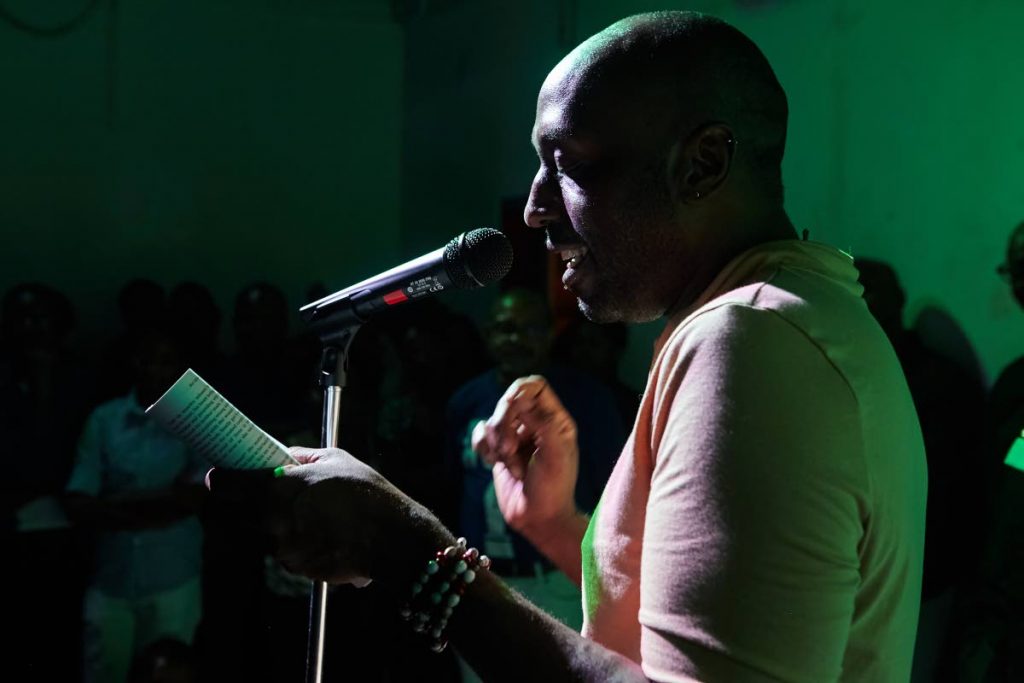Jamaican poet likens gays to ex-slaves

A Jamaican poet has likened the inclusion of street-dwelling gay men in Jamaica’s Carnival to the participation of ex-slaves in Carnival in 1800s Trinidad.
Prof Kei Miller on Monday addressed the opening ceremony of a symposium, Journey Around Myself, held at UWI, St Augustine, as part of Carifesta XIV.
He hailed the inclusion of marginalised groups in Carnival over the centuries, but lambasted professional-class Jamaicans and colonial-era Europeans for alleged exclusionary behaviour.
Miller, who has a PhD from Glasgow University, is a professor of English and creative writing at Exeter University, UK. In an essay published online last year, he suggested white women could not write fully about the Caribbean.
On Monday he said cash awards from Anthony Sabga and the Cropper Foundation had funded him to write. Miller has published novels and essays as well as poetry.
His talk showed how Trinidad Carnival had changed over time and itself been exported to other places where it served strikingly different social roles.
“The history of Carnival is a history of marginalised bodies including themselves in the mas. Carnival in new spaces can’t ever have the same meaning and depth as in TT, yet is significant and magical.”
Miller said in an era of copyright protection of artworks, he was very aware of the competing tendencies of nationalism to want protectionism versus regionalism, which requires generosity. Noting a hike in TT’s population in 1797 from 2,500 to 18,000 due to French island immigration under the Cedula, he said early Carnival saw planters use blackface so as to include black culture but not black people, but upon Emancipation black people participated. He quoted TT theatre historian the late Errol Hill as saying Trinidad Carnival had then had “a complete metamorphosis” and “a rebirth.” This had made it a local product in form, content and inner significance, Miller said.
He scoffed that the Port of Spain Gazette had decried the new Carnival as “wretched buffoonery” and “an annual abomination.”
More recently, scantily clad women have flaunted themselves in the mas, provoking grumbling akin to that in 1838 when emancipated slaves began participating.
Miller then contrasted the outcomes of the export of TT Carnival to London, UK, and to Kingston, Jamaica.
“Notting Hill Carnival (UK) begins in the shadow of the 1958 London race riots. West Indian bodies were not seen in daily life in the UK.”
On a personal note, he said it was no matter of pride to be the first black man to win literary prizes or to be one of just a handful of black professors in the UK.
He hailed Notting Hill Carnival for becoming relevant to its location and for being a celebration of the whole Caribbean, as shown by the equal measure of soca and reggae. Miller cited a poem that suggested that in the face of racism and discrimination, Notting Hill had let black men vent themselves by imagining themselves raping the Queen.
In contrast, Miller saw Jamaica’s Carnival as just as exclusionary as 1783 Carnival in Trinidad. “Uptown” residents excluded those from downtown Kingston, he said, often by the high price of admission tickets.
Also, uptown Jamaicans adopted TT soca music to give them a sense of Caribbeanness, even as Miller chided them for scorning dancehall music, which they viewed as “an obnoxious noise.”
He scoffed when he read one uptown representative hailing soca as joyful carnality, unlike dancehall’s bad carnality; hailing soca’s order, unlike dancehall’s violence and soca’s colourful pageantry in contrast to dancehall’s vulgarity.
Miller said dancehall was under no obligation to lessen its critique of Jamaica’s ruling class. While wealthier Jamaicans may not have adopted dancehall, he quipped that no invitation had been given: “That rejection goes both ways.”
Miller recalled a Trinidadian DJ once knowingly playing sexually provocative soca songs at a party in Jamaica where gay men began wining on each other, leading him to fear an outbreak of violence. He said a week later homeless gay men in drag had stormed a Carnival parade in Kingston, all ending up in bottle-pelting.
Supporting the incursion, Miller lamented that the Jamaican newspapers had decried the gay men in the same way as the Port of Spain Gazette in the 1800s had decried the entry of black bodies into Trinidad Carnival.
“Carnival outside of Trinidad never means the same thing as in the island of its birth, but that is okay. It will speak to us in different ways. It will offer us possibilities.”
Introducing the lecture were UWI principal Prof Brian Copeland, Culture Minister Dr Nyan Gadsby-Dolly and Prof Paula Morgan.


Comments
"Jamaican poet likens gays to ex-slaves"